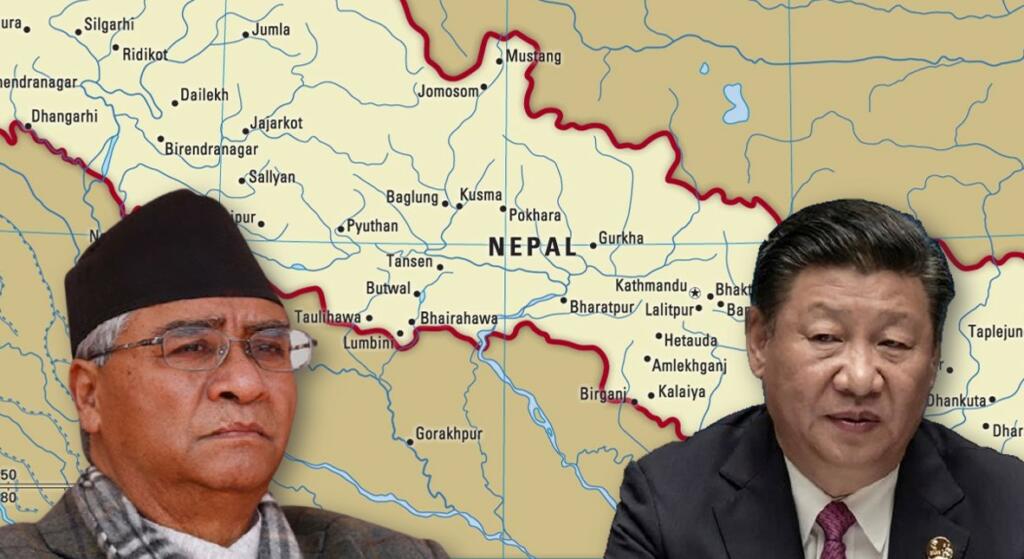It is amazing how a change in leadership can alter a country’s diplomacy upside down. When KP Sharma Oli was Nepal’s Prime Minister, China seemed to be in charge of Nepal’s political affairs. The paper dragon crossed all limits of diplomatic decency and interfered deeply in the internal affairs of the Nepal Communist Party which was in power at the time. China was reducing Nepal into a client country and looking to swallow it with its debt trap.
With the former Nepalese PM antagonising India and Chinese diplomats literally getting involved in the affairs of the Nepalese government, it seemed as if the Himalayan nation was going to ruin its historic ties with India and embrace the paper Dragon instead. But ever since Sher Bahadur Deuba came to power, Nepal has changed. It has reworked its ties with India and has also found its voice against China.
Voices against China rising in Nepal
As per Khabarhub, a Nepalese news platform, anti-China demonstrations have become a daily affair in the Himalayan country. Khabarhub reported that the Swantantra Nagarik Samaj (Independent Citizens Group) hit the streets in Nepal’s capital Kathmandu. They criticised the paper dragon for “interfering” in Nepal’s political and economic affairs, and also lambasted the Communist country for encroaching Nepalese land in northern districts including Humla.
The demonstrators carried placards and shouted slogans like “Down with China government”, “stop Chinese intervention”, “stop border encroachment”, and “ensure safe passage to Nepali students studying in China”.
Ramu Lama, a protester, said that China was imposing arbitrary blockades on Rasuwa and Tatopani checkpoints and was sabotaging Nepal’s relations with its friendly countries.
Nepalese demonstrators angry about Chinese interference
The ongoing protests in Nepal have been instigated by Chinese interference in the landlocked country. China has tried to expand its political, economic, and cultural footprint in Nepal. With its overt and covert activities, China has been occupying Nepalese villages, influencing Nepalese politicians and using diplomatic pressure to sabotage Indo-Nepalese ties.
Sher Bahadur Deuba has however pushed back against growing Chinese influence. He has immunised Nepal from the growing Chinese interference in the Oli era. This is emboldening pro-India, anti-China elements in Nepal.
Read More: Oli out, Deuba in: The new Nepalese Prime Minister is pro-Hindu, pro-India and bad news for China
Several social organisations in Nepal have lambasted China’s “conspiracy” to expand its footprint in the landlocked country and have organised protest rallies against the Communist country.
Sino-Nepalese ties getting jeopardised
The ongoing demonstrations in Nepal are now taking a toll on Sino-Nepalese relations. Reportedly, the Rasuwagadhi and Tatopani border points have been blocked by China and transit of goods is not being allowed.
China had itself declared Rasuwagadhi-Kerung border point as the leading route for its Belt and Road ambitions in Nepal. Oli too had tried to appease China’s Communist leadership and had taken special measures to open up Nepal’s borders with its northern neighbour. In 2016, a Sino-Nepalese transit agreement allowed the import and export of goods by Nepal from third countries via Chinese seaports.
The paper dragon had promised to transform Nepal from a landlocked to a “land-linked” country. But Nepalese businessmen are not able to access China now. The Rasuwa and Tatopani are the two main border checkpoints for bilateral trade between Nepal and China. And the paper dragon has obstructed both these checkpoints. This is making Nepali people angry and is leading to even more vociferous protests against the Communist country.
Evolving Sino-Nepalese ties have become a thing of the past, as Kathmandu finds its voice against China under the watch of Sher Bahadur Deuba.
